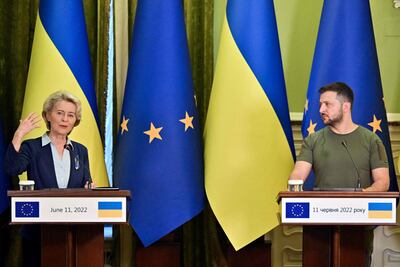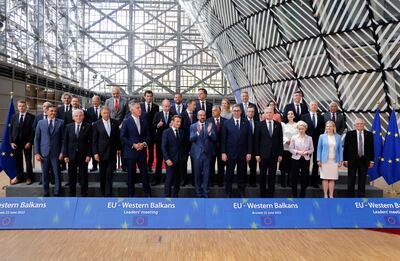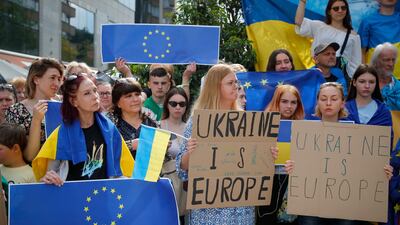Ukraine was poised on Thursday to be granted candidate status by the European Union, an important symbolic step in its quest to free itself once and for all from Russia’s unrelenting grip.
President Volodymyr Zelenskyy said the expected decision would take Ukraine “into the light from the darkness”, after lobbying EU leaders to give hope to his people at a traumatic time for the country.
Moldova is also set to be named a candidate, with both countries told that progress towards joining the EU will depend on rooting out corruption and other reforms to meet the bloc’s standards.
The process could take many years and the leader of impatient fellow applicant Albania said the Ukrainian people should have no illusions about a rapid accession to the EU.
But EU leaders meeting in Brussels said candidate status for Ukraine would be a “historic moment”, as European Council President Charles Michel put it, and a show of solidarity while it fights Russia’s offensive.
“History is on the march,” said European Commission President Ursula von der Leyen, as the 27 fully fledged members prepared to give their verdict on Ukraine’s application.
All 27 need to approve candidate status for Ukraine and Moldova but no country signalled in preliminary talks that it would block the process.
A senior EU official said surprises were always possible but that they did not foresee any problems. Hungary, which has angered allies with its hardball diplomacy over sanctions, has said it supports Ukraine’s application.

Ukraine applied in February and immediately won support from many countries in the former Soviet sphere of influence but senior figures in western Europe were unwilling to tear up the EU’s rule book.
But countries including Denmark, Germany and the Netherlands, which initially expressed reservations, have said they are willing to take the first step on Ukraine’s candidacy.
Germany wants to see language in the conclusions of this week’s EU meeting reflecting the fact that the bloc must also be ready to absorb new members, government sources said.
The commission recommended last week that Ukraine’s application be taken forward on the understanding that it strengthens the integrity of its courts and tackles the “excessive influence” of wealthy oligarchs.
Georgia, another former Soviet country seeking EU membership, is likely to be told it is not yet ready for candidate status like Ukraine or Moldova, but can realise its ambition if it makes the necessary reforms.
EU foreign policy chief Josep Borrell said Georgia “should not look at that in a negative way … now they have a clear path”.
Ukraine has long sought Nato as well as EU membership, although it has indicated it could drop that demand in any peace deal with Moscow. Preventing Ukraine's western drift was widely seen as the ultimate goal of Russia's invasion in February.
Balkan countries that have been in the EU’s waiting room for longer did not express resentment towards Ukraine’s rapid progress but said it was time their applications were taken forward, too.

Albania and North Macedonia are candidate countries but progress on their applications is effectively blocked by Bulgaria, which has a variety of historical and political grievances with North Macedonia.
That logjam was only made more complicated when the Bulgarian government was defeated in a confidence vote on the eve of Thursday’s summit.
“It’s a disgrace that a Nato country, Bulgaria, kidnaps two other Nato countries … in the midst of a hot war in Europe’s backyard,” said Albanian Prime Minister Edi Rama.
He said it was “a good thing to give candidate status [to Ukraine] … but I hope the Ukrainian people will not make many illusions”.
EU officials have spoken of trying to offer applicant countries some of the benefits of being in the European fold before their accession is complete.
Leaders were expected to discuss French President Emmanuel Macron’s idea of a looser geopolitical community that could include Ukraine or even Eurosceptic countries such as Britain.
But Vjosa Osmani, president of fellow applicant Kosovo, expressed hope that Ukraine’s candidate status could provide momentum to the long-stalled applications from the Balkans.
“I don't see any harm whatsoever towards the Western Balkans if Ukraine and Moldova move on, quite the opposite,” she said.
“I believe that by opening their doors to Ukraine and Moldova, the European Union is sending a strong message that this is of geostrategic importance, it's a geopolitical decision and that's exactly what the Western Balkans needs.”


